 Tax Planning as per Income Tax Act
Tax Planning as per Income Tax Act
Tax planning as per the Income Tax Act, refers to the legal and strategic management of financial affairs to minimize tax liabilities within the framework of tax laws and regulations. The Income Tax Act provides provisions and guidelines that individuals and businesses can utilize for tax planning purposes.
Some key aspects of tax planning as per the Income Tax Act include:
1. Understanding Tax Laws:
Tax planning involves having a thorough understanding of the tax laws and provisions outlined in the Income Tax Act. This includes knowing the various deductions, exemptions, allowances, and incentives available under the law.
2. Optimizing Deductions and Exemptions:
Tax planning involves identifying and maximizing deductions and exemptions that an individual or business is eligible for. This can include deductions for expenses like medical bills, education expenses, house rent, and exemptions for certain income sources.
3. Utilizing Tax-Advantaged Investments:
Tax planning may involve investing in tax-advantaged instruments such as Public Provident Fund (PPF), National Savings Certificate (NSC), tax-saving fixed deposits, or tax-saving mutual funds. These investments offer tax benefits under specific sections of the Income Tax Act.
4. Capital Gains Tax Planning:
Capital gains tax planning involves strategically managing the sale of assets such as stocks, real estate, or other investments to minimize the tax liability arising from capital gains. Techniques such as indexation, tax-saving bonds, or utilizing exemptions like reinvestment in specified assets may be employed.
5. Business Tax Planning:
For businesses, tax planning can involve structuring business operations in a tax-efficient manner, utilizing tax incentives and deductions available for specific industries or activities, and managing tax implications related to transactions, depreciation, and inventory.
6. Timing of Income and Expenses:
Tax planning may involve timing the recognition of income or expenses to optimize tax outcomes. This could include deferring income to a subsequent year or prepaying certain expenses to claim deductions in the current year.
7. Compliance with Tax Laws:
Tax planning is always conducted within the framework of tax laws and regulations. It is important to ensure compliance with all legal requirements and disclosure obligations while implementing tax planning strategies.
It is essential to note that tax planning should be conducted in a legal and ethical manner, focusing on optimizing tax benefits within the boundaries of the law. Consulting with a qualified tax professional or seeking expert advice can help individuals and businesses navigate the complexities of tax planning as per the IT Act.
To visit- https://www.mca.gov.in/

For further details access our website https://vibrantfinserv.com
